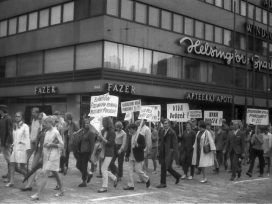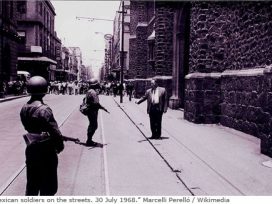“Manufacturing scarcity” is the new watchword in “Green capitalism”. James Heartfield explains how for the energy sector, it has become a license to print money. Increasing profits by cutting output was pioneered by Enron in the 1990s; now the model of restricted supply together with domestic energy generation is promoted worldwide.
Articles
Read more than 6000 articles in 35 languages from over 90 cultural journals and associates.

1968 in Moscow
A beginning
Aleksander Daniel locates the birth of the dissident movement in an appeal broadcasted by western radio on 11 January 1968, protesting against the trial of Aleksandr Ginzburg and three other system-critical writers. “This represented a strike against one of the standard elements of Soviet psychology, one which had been cultivated over many decades: the concept of ‘hostile encirclement’, the complex of the ‘besieged fortress’. To appeal to world public opinion, to the ‘enemies’ – i.e. airing dirty laundry in public – was equivalent to treason, to betrayal of the homeland.”
More than four years after the failure of the UN-sponsored Annan plan, the Greek Cypriot president, Dimitris Christofias, and Turkish Cypriot leader, Mehmet Ali Talat, are to re-open negotiations on 3 September. But in spite of their declared aim to agree a bi-zonal federation by spring 2009, the political crisis in Turkey may undermine their efforts to reunify their common homeland.

The end of illusions?
Czechoslovakia 1968 and after
The Soviet invasion of Czechoslovakia in August 1968 caused the Soviet empire to lose its internal logic even for the communist faithful, writes Samuel Abrahám, who bore witness to the events. Yet today, the naivety of the reform communists of the 1960s serves as a pretext for the cynical dismissal of any vision of a better political system.
The Xinjiang Uighur Autonomous region of China has seen a series of clashes between the majority Uighurs and Han Chinese settlers since the 1980s. But it was in the city of Yining that the largest protest took place on 5 February 1997. Initially written off by the Chinese authorities as an outbreak of random violence, since 9/11 it has been portrayed as the work of Islamist separatists. Nick Holdstock reports on a more nuanced reality of unemployment, religious repression, and the wish for independence.
While the resistance in Tibet has drawn the most attention, two other forms of protest are making life increasingly uncomfortable for the Chinese government: dispossessed landowners and environmentalists. Popular protest is set to dominate the agenda beyond the Olympic Games, writes He Qinglian.
Blurred boundaries
Sport, art and activity
Is the convergence of art and sport under the pressure of pseudo-participatory spectacle undermining the utopian potential of both? Benedict Seymour goes back to the future to recover the new kind of activity which, in different ways, informs them still.
‘Chile Si, Junta No!’
Political protests at the 1974 FIFA World Cup
Chile’s participation in the 1974 FIFA World Cup in Germany provided an opportunity for leftwing groups to make their opposition to the Chilean government junta visible to an international public. Wolfgang Kraushaar chronicles.

Murder in Mexico
Chronicle of a massacre
Sports journalist Brian Glanville was sent to Mexico City in 1968 to cover the Olympics but instead found himself reporting on the anti-government demonstrations at the Plaza de las Tres Culturas. Despite the ensuing massacre, he recalls, indifference reigned at the Olympic Village.
Since the publication of his first book, “The Birth of Tragedy”, Nietzsche’s writings have been a source of heated controversy. For over a hundred years he had his fair share of admirers and critics. In the last few decades, however, mainly in response to Heidegger’s monumental Nietzsche study, attention has shifted from what actually Nietzsche said to the underlying philosophical themes that might have motivated, or even mitigated, what was said.
"Emancipation is not an all or nothing affair"
Interview with Nancy Fraser
Feminist critical theorist Nancy Fraser outlines in interview her concept of “parity of participation”, or the representation of women in institutional structures. The concept, she argues, bridged the traditional leftwing theoretical dichotomy between distribution and recognition and in turn raises the question: who determines who is to be represented? Here Fraser emphasizes the centrality of the politics of interpretation in any dialogue about justice, such as that between western feminism and Islam.
Head-on collision in the Rospuda Valley
Poland: transport versus nature
The dispute over construction of a four-lane bypass through the Rospuda Valley, a pristine wetland valley in north eastern Poland subject to the highest protection under European nature law, has gained a high profile at European level. With the intervention of the European Commission and European Court of Justice, the case is breaking new ground and should serve as a precedent for other countries in applying EU nature conservation law. The proposed bypass is just one – albeit the most high-profile – of a number of major road projects on the likely route of the Trans-European “Via Baltica” road corridor that will damage valuable wildlife sites in north eastern Poland, and is therefore a symptom of a much wider problem.
Multiculturalist advocacy of collective rights has opened the door in some western nations for religious law to take precedence over civil law, argues Kenan Malik. Partly responsible is the idea that human beings are bearers of a particular culture as opposed to social and hence transformative beings.
Outlining the destiny of the Olympics from 1936 to the present, Paul Sims notes that sport is now so popular it has taken on the characteristics of a modern secular religion. But in spite of the use and abuse of various sporting events, politics is forgotten when the starting gun is fired.
Liberal values can be twisted to justify limiting civil rights, warns Will Kymlicka in interview. Nevertheless, religious law may not replace the civil code. “The same forces that support ethnic politics within liberal democracy also operate over time to channel it in peaceful and democratic ways.”